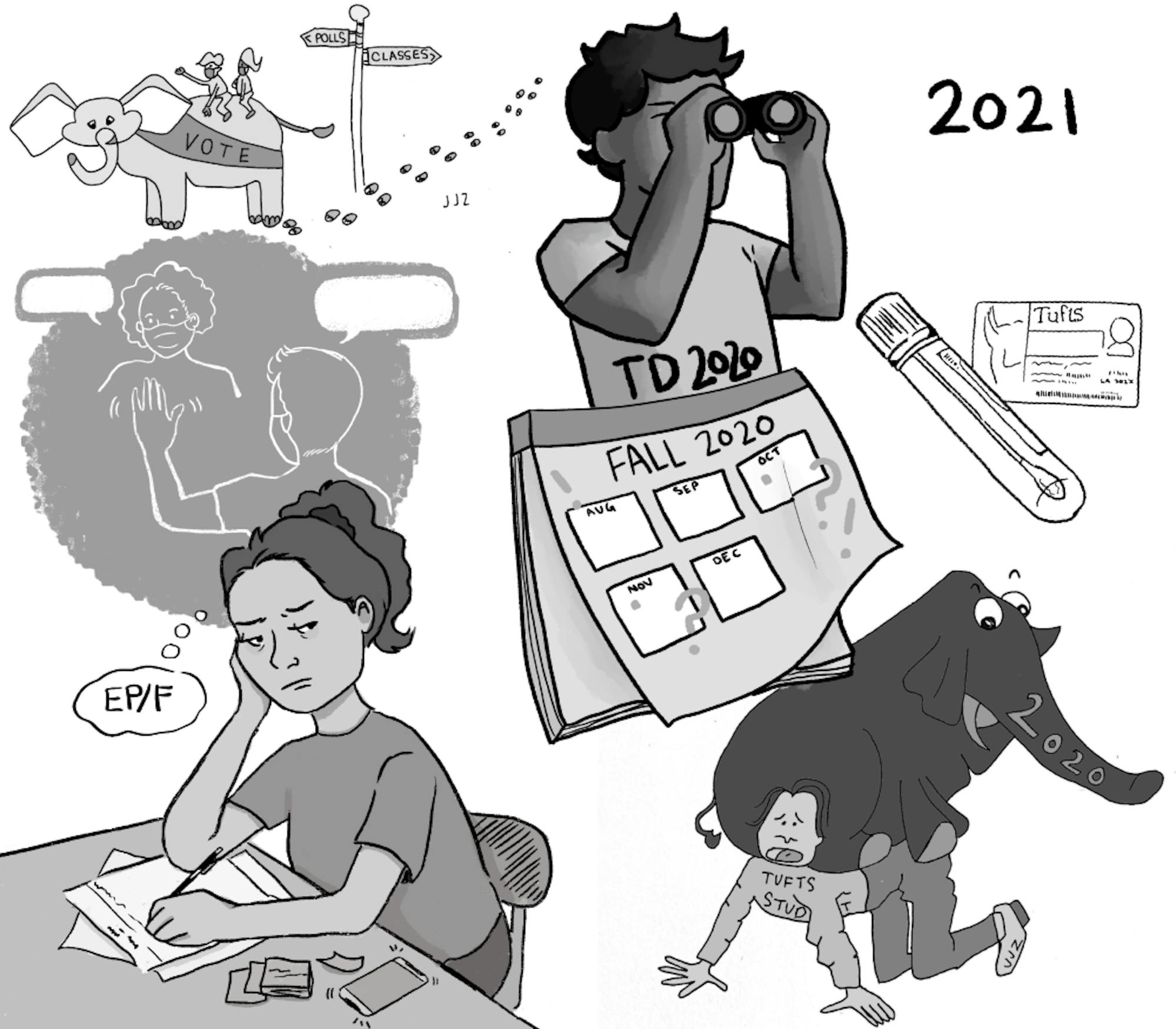Our community faced myriad challenges this semester, ranging from the spread of COVID-19 on our campus, to social isolation, to a divisive presidential election. While many of us may want to put this semester and the rest of 2020 behind us, it is still important to take a moment to critically reflect upon the issues that our community faced this semester as well as the change we must commit to fighting for in the coming year.
The fall semester was defined by our community’s adjustment to hybrid learning, which brought questions of how to best support students and staff while still following through with the university’s commitment to academic continuity. Students faceddifficulty accessing academic resources, collaborating with others and maintaining a work-life balance.These challenges were heightened forremote students andthose with majors that heavily rely on in-person instruction and collaboration. While the administration attempted to mitigate student stress bycontinuing its Exceptional Pass/Fail and credit transfer policies, students still enter finals season experiencingacademic burnout and heightened levels of stress.
To ameliorate the challenges of hybrid learning in the future, Tufts must continue to institute flexible, empathetic academic policies and find creative ways to keep students engaged. Given that these academic challenges will likely continue into the spring, Tufts administrators should continue Exceptional Pass/Fail and credit transfer policies into next semester, and professors should prioritize student well-being in designing their course material for the spring.
Despite theconcerns of local residents and obvious risks associated with bringing students back to campus, Tufts made its community’s health apriority this semester by implementing realistic and effective strategies to limit the spread of COVID-19 on campus. Tufts’ testing program, in tandem with itscomprehensive COVID-19 guidelines,helped maintain arelatively low positivity rate across Tufts campuses.Even when cases increased in recent weeks, Tufts reacted efficiently,adjusting the testing schedule and bringing cases back down. This proved Tufts’ exemplary ability to continue on-campus operations while still working to keep the community safe.
As the weather got colder, however, safe ways to socialize became increasingly limited. Perhaps as a result, our community witnessed anincrease in cases and close contacts in mid-November, which the university attributed to students potentially not adhering to university social distancing protocols. As we look toward the spring, it is crucial that the university provide students withsafe, outdoor options to socialize while students continue to diligentlyfollow university guidelines in order to contain the spread of COVID-19 on campus.
When planning for the spring, the administration should also take a moment to reflect on the problems caused by the university’s academic scheduling this fall. Despite student concerns,Tufts continued to hold classes onIndigenous Peoples Day, undercutting the day’s purpose to reflect upon this nation’s history of colonialism and systemic racism.Continuation of classes onElection Day embodied yet another contradiction between the university’s ideals and its practices; in the midst of a monumental election and collective uncertainty about the future of the country, the university contradicted itscommitment to civic engagement and instead prioritized academic scheduling. This trend continued into scheduling for the spring, as Tuftsdecided to start the semester later and shorten spring break. Though this decision was made to allow adequate time for cleaning and the staggered arrival of students, a condensed semester could jeopardize students’ mental health.
Leading up to the spring, Tufts must find ways to realistically balance academic scheduling concerns with a better recognition of important nation- and campus-wide dates. Further, if the high stress levels from this semester offer any indication of what next semester holds, the university should redistribute days off and plan future semesters’ schedules with greater sensitivity to students’ mental health.
Despite the continuation of classes on Election Day, our community’s commitment to civic engagement and political advocacy was evident and commendable leading up to the election. Strongyouth mobilization, both on our campus and across the nation, helped propel former Vice President Joe Biden to a win that was buoyed byrecord levels of voter turnout across the country and theorganizing efforts of Black communities. Yet as we celebrate these strides, we must alsoacknowledge the substantial work that lies ahead. We must address the deeply divided electorate and fightattempts to undermine our democratic systems. As the recentcrisis within the TCU Senate demonstrated, we must also commit to engaging in and preserving the democratic process on campus. In the next four years, we must mobilize the Biden administration with the knowledge that the fight for equality and social justice does not end at the ballot box.
Though full of challenges, this semester was a testament to the strength and resilience of the Tufts community. Still, as we grapple with the pandemic and an ever-changing world, 2021 will bring obstacles of its own. In making its own resolutions for the new year, Tufts must learn from the valuable lessons this semester presented to our community and commit to preserving compassion, justice and well-being in all university policies.





